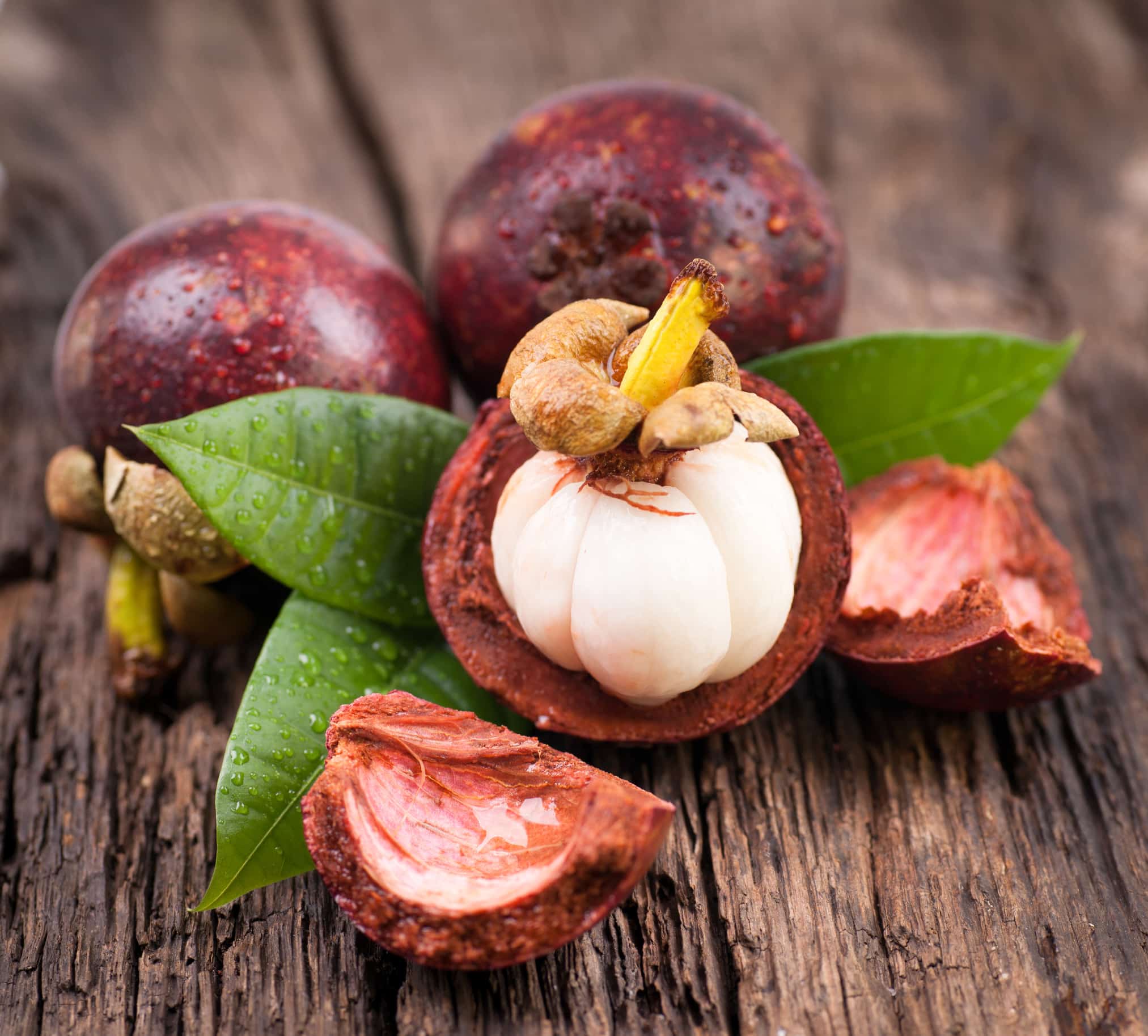Mangosteen

The mangosteen tree and its fruits
Originally native to the Malay Peninsula, the mangosteen tree can now be found in other countries such as Thailand, Sri Lanka and Brazil. This imposing tree can reach a height of up to 25 meters, and its fruits are characterized by their purple skin and their size, comparable to tomatoes. In this country, the consumption of fresh fruit is quite difficult, since the fruit is difficult to obtain in our country and also very expensive. Responsible for the high prices is the fact that the fruit must be harvested when ripe and then immediately transported by air. And another factor plays a role: the mangosteen tree bears fruit for the first time after about ten years. However, it can be harvested twice a year.
Mangosteen: A health miracle with many facets
For generations, the mangosteen fruit has been valued in traditional medicine and Southeast Asian folk medicine. It is used to treat skin infections, wounds, diarrhea, cardiovascular disease, and urinary tract infections. Numerous scientific studies have proven its extraordinary effectiveness. Current research even suggests that the fruit may be used in the fight against cancer. The extraordinary importance of Garcinia mangostana for health is based on its more than 40 different xanthones. These antioxidants act as powerful anti-inflammatories and strengthen the immune system. Particularly noteworthy is the xanthone and polyphenol alpha-mangostin, which is found in high concentrations in the flesh of the fruit. In addition, the mangosteen fruit contains various secondary plant compounds such as terpenes, anthocyanins, tannins and phenols, which are of great medicinal interest. They provide protection against insect feeding, fungi, bacteria and viruses, and also perform important functions in the human organism, especially in the fields of antibacterial, antifungal, antiallergenic and antioxidant.
Mangosteen is often offered as a dietary supplement in the form of juice, capsules or tea. It is largely considered safe to use, although some people may experience hypersensitivity. Excessive consumption can cause hyperacidity in the blood, and interactions with antihistamines cannot be ruled out. Pregnant and lactating women should refrain from consuming mangosteen as a precaution.
In addition to dietary supplements, it is also possible to enjoy fresh fruit. However, this is difficult in our latitudes, as the fruit is difficult to obtain and also quite expensive. The high prices result from the need to transport the ripe fruit by air immediately after harvesting. Another factor is the long waiting period, as the mangosteen tree only bears fruit after about ten years. Nevertheless, it can be harvested twice a year.
Mangosteen in cosmetics: versatile application for radiant skin and healthy beauty
Not only in the field of health, but also in cosmetics, Garcinia mangostana has taken on an increasingly important role. Its use in deodorants is particularly impressive, where its astringent effect stands out. The term “astringent” here means that the human sweat glands are contracted by the use of the mangosteen fruit. This natural effect has the effect of reducing sweat production and effectively preventing unpleasant odors. When used correctly and in moderation, there is hardly any annoying itching or burning.
Mangosteen has become increasingly important in the cosmetics industry due to its rich bioactive compounds and antioxidant properties. In addition to its aforementioned use in deodorants, this versatile ingredient is also used in a wide range of skin care products and cosmetics.
In skin care, mangosteen provides valuable support due to its anti-inflammatory and antioxidant properties. It can be used in creams, lotions and serums to protect skin from environmental damage, promote elasticity and minimize signs of premature aging. Additionally, it could help treat acne and blemishes by reducing inflammation and soothing the skin.
An interesting application is also skin whitening and reducing hyperpigmentation. The antioxidant properties of mangosteen could help promote a more even skin tone and reduce unwanted dark spots.
Due to its natural antihistamine action, mangosteen is also suitable for soothing and relieving skin irritation and reducing allergic reactions. This makes it a valuable ingredient in sensitivity-reducing products.
Not only is mangosteen used for skin care, but also for hair care. It can help soothe the scalp, reduce dandruff and promote hair growth. For more information on scalp care, read our article.
In addition, mangosteen is used in the production of natural flavors for perfumes, body oils and other fragrant cosmetic products.
If you would like to have your own cosmetics produced with mangosteen, you have come to the right place.
Profile – Garcinia Mangostana:
INCI: Garcinia Mangostana Peel Extract
Appearance: Yellow powder
Solubility: Oil soluble
CAS number: 6147- 11- 1
Garcinia Mangostana: The miracle fruit
The mangosteen convinces with tangible arguments Especially in Southeast Asian countries, Garcinia Mangostana is touted as a veritable miracle fruit. This expression is perhaps a little out of place, since the effectiveness of the substance has been scientifically proven unequivocally and is not based on hair-raising legends. Nevertheless, the enormous versatility of mangosteen can definitely be called extraordinary, remarkable and highly effective. Garcinia Mangostana is used against a wide variety of ailments, it strengthens our defenses and immune system, is even considered an excellent fat burner and can also develop its excellent effect in deodorants. Let Cosmacon advise you on all aspects of the raw material and its use in interesting formulations.
Sources:
A Review of the Influence of Various Extraction Techniques and the Biological Effects of the Xanthones from Mangosteen (Garcinia mangostana L.) Pericarps.; Yuvanatemiya V, Srean P, Klangbud WK, Venkatachalam K, Wongsa J, Parametthanuwat T, Charoenphun N.Molecules. 2022 Dec 10;27(24):8775
Antioxidant activity and polyphenol content in extracts from various parts of fresh and frozen mangosteen.; Muzykiewicz A, Zielonka-Brzezicka J, Siemak J, Klimowicz A.Acta Sci Pol Technol Aliment. 2020 Jul-Sep;19(3):261-270.
Antiacne and antiblotch activities of a formulated combination of Aloe barbadensis leaf powder, Garcinia mangostana peel extract, and Camellia sinensis leaf extract.; Waranuch N, Phimnuan P, Yakaew S, Nakyai W, Grandmottet F, Onlom C, Srivilai J, Viyoch J.Clin Cosmet Investig Dermatol. 2019 May 30;12:383-391.